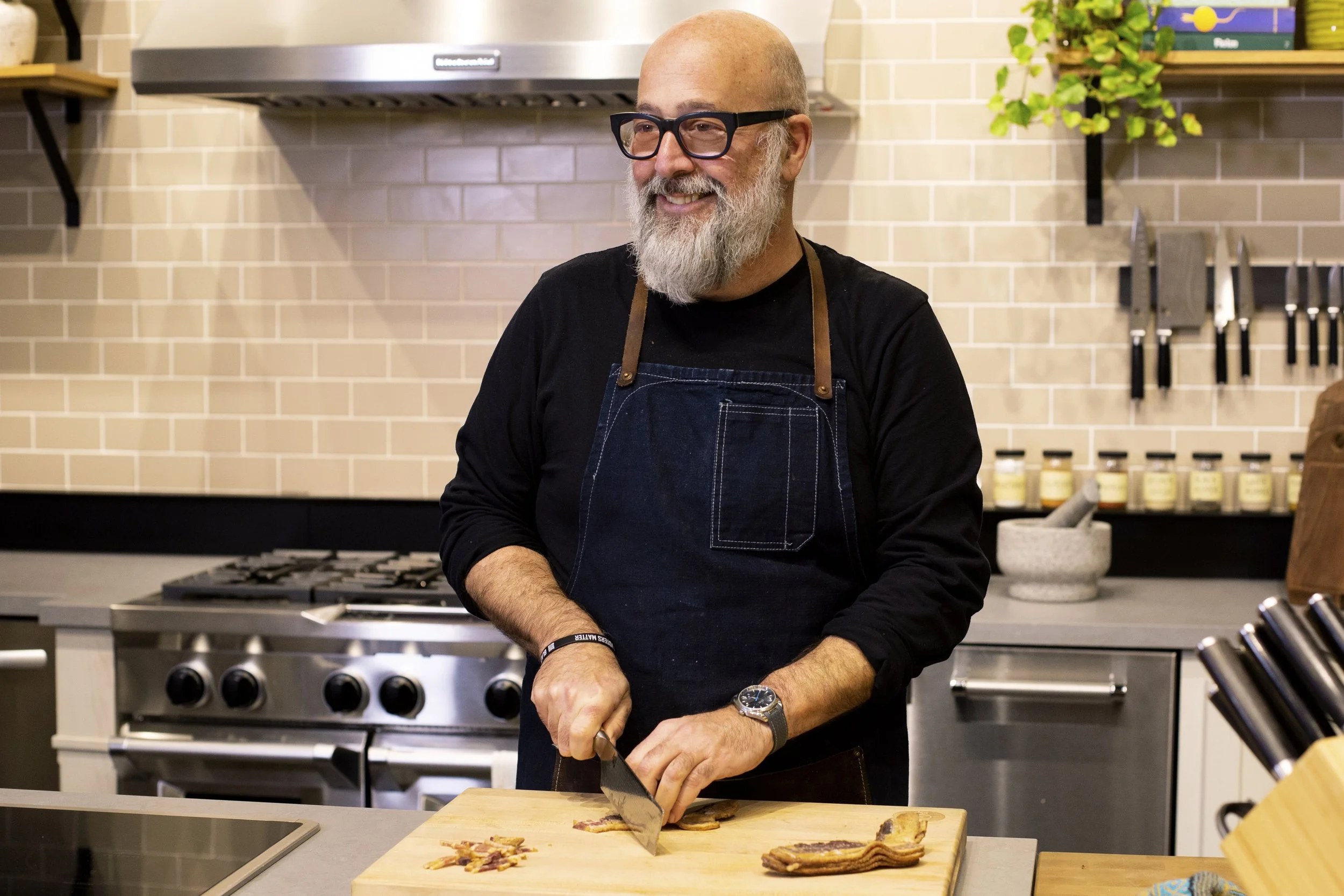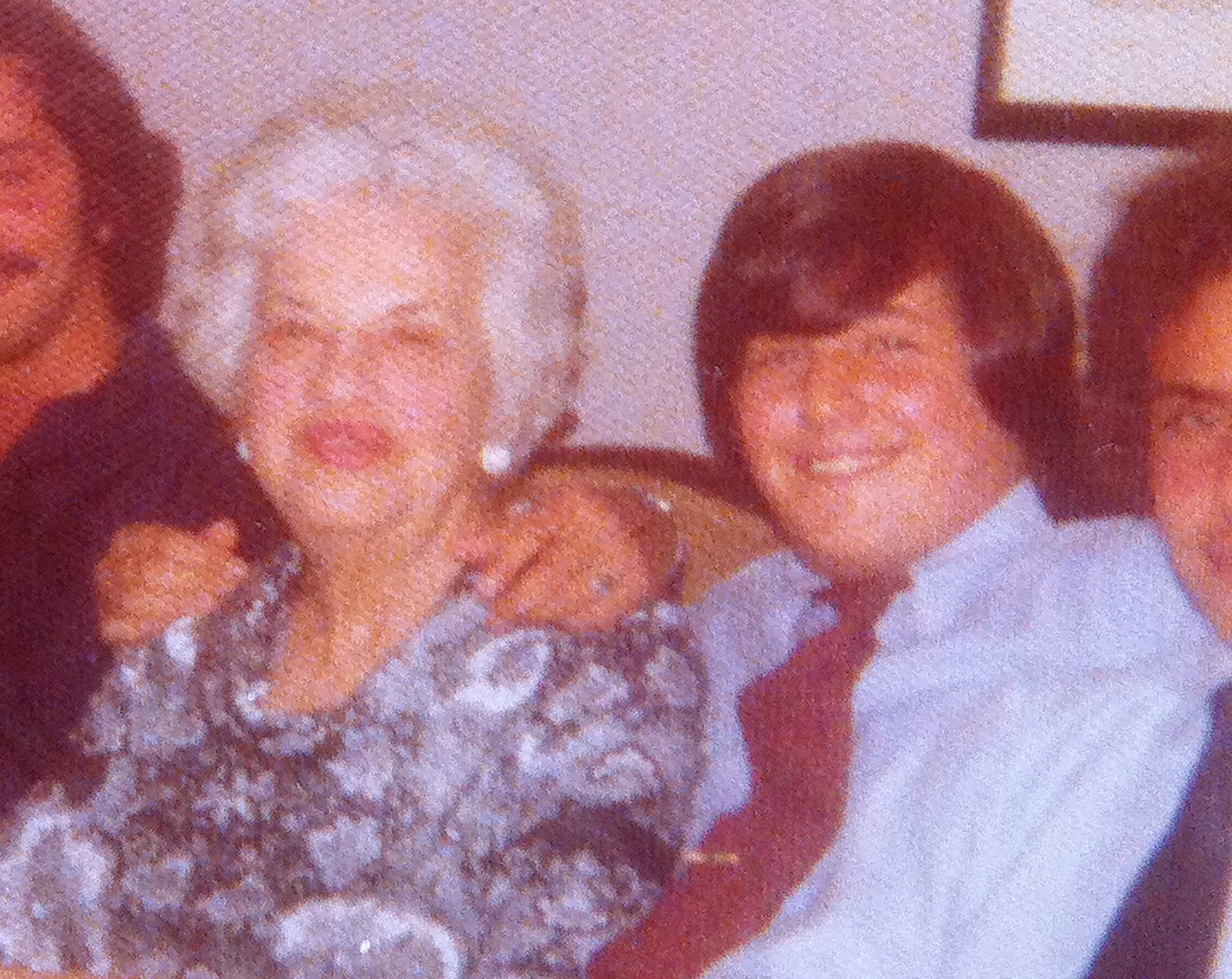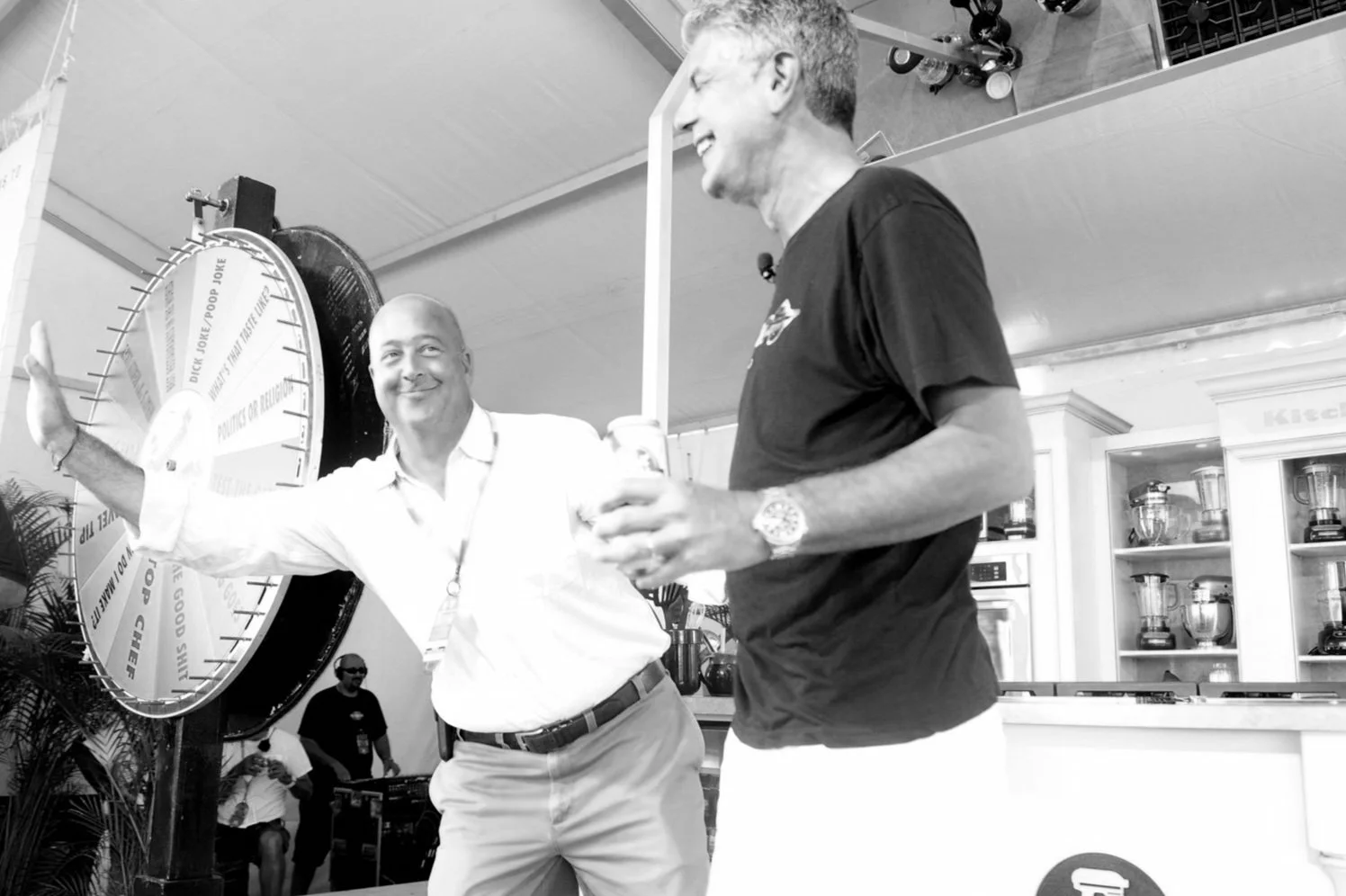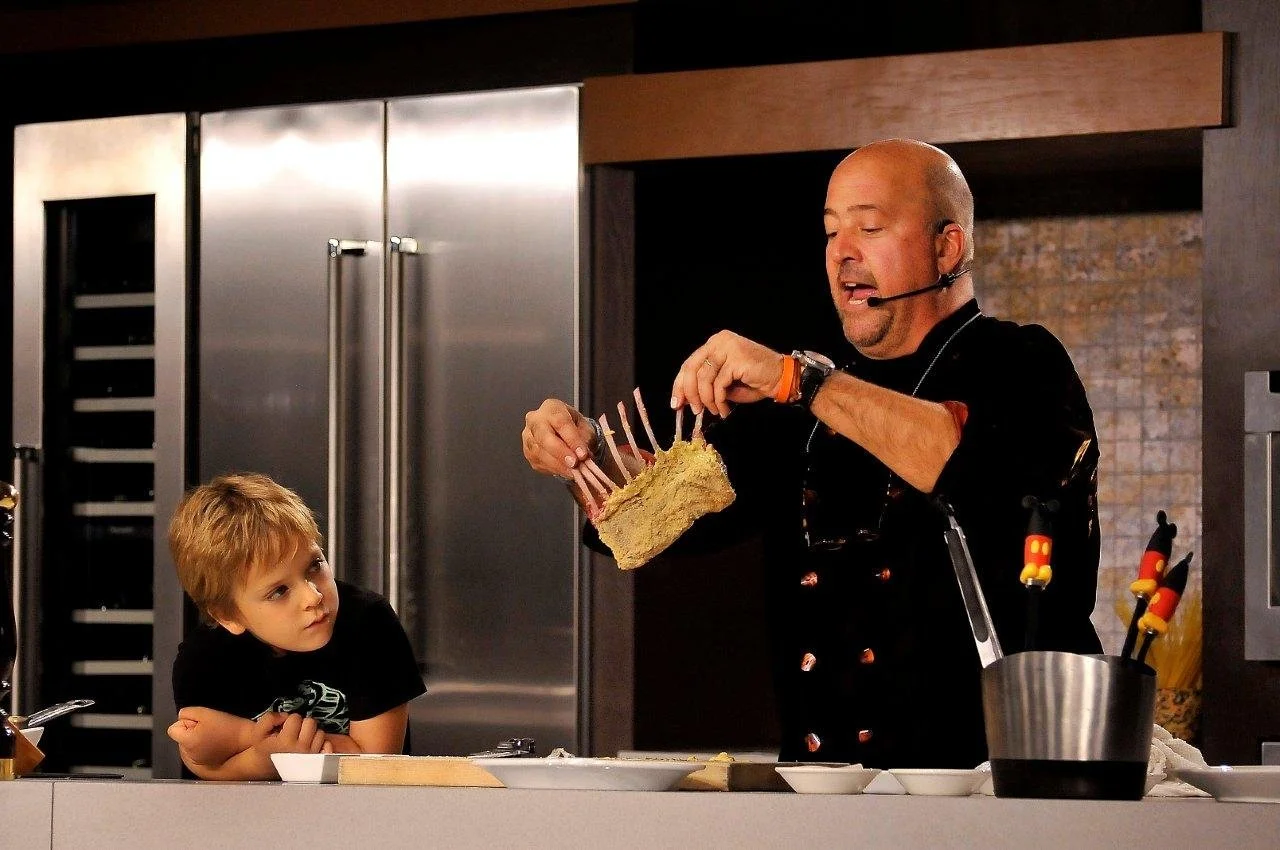Interview with Andrew Zimmern
Andrew Zimmern is an American chef, author, and television host.
I Saw Andrew Zimmern Drinkin’ A Many Pina Coladas at Trader Vic’s
Contents
Max Raskin: Let me start with a stupid question — what did you have for breakfast today?
Andrew Zimmern: I had a cup of coffee and a shot of espresso. It's 10:00 AM here in Minnesota and I'm starting to feel a little peckish.
MR: So what are you going to eat next?
AZ: There's going to be some foraging in the fridge at the office. I'll probably find nothing and simply have to eat an early lunch.
MR: What will that be?
AZ: That will be probably a salad sampler from the local restaurant that I get lunch from most often around the corner. It's the closest place to my office. They have very nice food, and they have this salad sampler where they have a little scoop of fresh egg salad, tuna salad, and chicken salad over greens that has become my go-to thing.
MR: What's the restaurant called?
AZ: It's called Yum!
MR: I want to talk a little about growing up — your mom knew Trader Vic?
AZ: Oh, very well. My mother went out to Mills College in California and roomed with Trader Vic Bergeron's daughter. And freshman year, he started bringing them over to the restaurant and to the house and taught them both how to cook.
MR: I only knew about it from of the song “Werewolves of London.”
Would you eat there?
AZ: Oh, yeah. The Trader Vic's in New York was in the basement of the Plaza Hotel and it was my happy place. It was the most amazing, awesome, fantastic place for young underage kids to get drunk and eat what they called Polynesian food in the mid- and late-70s.
I kept going there for a couple years into the 80s before my drugs of choice got harder and my alcoholism got more rapacious and predaceous, and I chose to drink elsewhere. But in high school, I think we went there every single week at least once. Sometimes during holidays, three, four nights in a row. It was dark and moody and beautifully styled. The Scorpion bowls for eight were great. The other drinks were super strong. The food was exactly what we wanted to eat with them, and my gang of friends and I would go there frequently to start the night before going to a party or finish the night there.
MR: Where would you drink when you started getting into heavier stuff? What were the places back then in New York that you remember?
AZ: Well, you have to understand that in the 70s in New York, there were four or five places that would serve this group of private school kids from the Upper East and West Sides that socialized uptown — places ranging from JG Mellon to Jim McMullens to Trader Vic's, the Blarney Stone…and a whole bunch of other places where no one carded you. That was yet to come.
When things turned a little darker for me, I would start out many nights at the Bull and Bear bar in the Plaza Hotel because they would give you drinks in these quart-sized martini cups. It was insane. And one or two of those would get me ready to go out to, quote, unquote, "then drink normally in front of other people," even though I'd already had plenty of booze in my system.
As I started to turn 20, 21, 22 — I’d spend more time drinking alcoholically before and after my socializing with friends in shot and beer bars that just existed all over New York. I chose to do that privately, secretly, and away from people. There was a really fun bar that opened that my friends and I frequented called Automatic Slims. The first couple years that opened, that was a hot place to drink.
But I kept going to Corner Bistro, to JG Mellon, as places that I knew I could get a table, sit in the back, drink, eat, hang out with friends.
Steal This Interview
MR: What is it that's so romantic or badass about chefs and people who are interested in food? Were there any books like Orwell's Down and Out in Paris and London that influenced your thinking of the chef as romantic?
AZ: Yeah. Abby Hoffman's Steal This Book.
I came to a lot of the other writers — anarchists and other assorted types later in life — but when I was 10, 12, 13, in that era, me and a whole bunch of friends all read Abby Hoffman's Steal This Book. In it he talks about how to make sandals out of old tires, but he also tells you how to make a Molotov cocktail.
MR: You probably thought it was a drink.
AZ: I think I fell in love with that book because it appealed to an urge inside of me to be a risk-taker. It appealed to the overly-educated iconoclast inside me, the ego inside me, "Hey, I know better than other people." None of these are good things, by the way. They wound up being the tools of my destruction and things that I try to avoid these days for my own survival because I know what happens when I add those into the daily makeup of my life.
But that was the book that did it for me.
The summer I turned 14, which was 1975, my father told me, "There's no more allowance. Get a job." And I went and got a job with of my godparents who owned a restaurant in East Hampton, Long Island, called The Quiet Clam. All my other friends were working at the landscaping places around town, and I thought, "Well, this is ridiculous. I'm not getting up at five in the morning and hauling wheelbarrows of manure and building berms and planting trees at people's houses and laying sod and then going to the beach at four o'clock when the day is over to rinse off."
I wanted to be on the beach all day long because that's where the girls were, that's where the waves were, that's where the food was, and then go to work at 3 o'clock, 4 o'clock for the dinner shift in the restaurant and that's how I spent a lot of those summers.
MR: Bourdain had a similar thing in Provincetown.
What is it about the food world where there's such a high rate of addiction?
AZ: There's a lot of stress, a lot of fast-moving parts, a lot of surprise and change every day in a restaurant. There's very little that you can depend on. It creates free floating anxiety for people. You walk into work every day, "Which personality of my job is going to change? Which part of it is going to be different today?" For some people, they have tools to handle that emotionally. Others don't have tools, and you very quickly learn that there are several things that can make you not feel your feelings: pills, booze, weed, hard drugs.
MR: Do you go to therapy now?
AZ: I've been in and out of therapy since I was 10 years old.
But I think, and this is not quantifiable, but that is that there are certain industries that people, even subconsciously, are drawn to because they are not the nine-to-five man-in-the-gray-flannel-suit-type jobs. So anarchical, iconoclast, overly-educated lunatics like myself — it never occurred to me to go work at an ad agency or Wall Street or anything that had to do with nine-to-five and accountability of that type.
I also happen to know that from the time I was about five years old, I remember advocating that I was going to work in food. It was quite a surprise to my parents. It's all I really ever wanted to do, was work in food. It's all I ever talked about.
But I also know people who came to food later in life who found this world that perfectly suited them. I think actually we sort of select those places.
Radical Chef
MR: Just to talk about your worldview, I interviewed Al Franken, who's from Minnesota…
AZ: …good friend of mine.
MR: There's something about Jews from Minnesota who have a certain kind of politics. Do you talk politics?
AZ: I do.
Every time I make a comment that is civic or political on Twitter, I get a ton of, "Go fuck yourself. Keep your big fat mouth shut when you're eating. You slob. Stay in your lane. We come to you for food. We don't care about your politics." That literally happens all the time. I decided last month to focus on other things on social media, mostly because you don’t change anyone’s minds, there is no meaningful discourse, and my energy is best devoted to other things.
Being a child of the 60s, both my parents were very active, very liberal progressives. So I marched, I did candlelit vigils. My mother was one of those women in a Tom Wolf book where he talks about the housewives on Park Avenue filling their living rooms with Black Panthers to raise money for them.
MR: Radical Chic: That Party at Lenny’s.
AZ: That was my mother.
And my mother was a co-founder of a group in the late 70s, early 80s called Humans Against Rabbit Exploitation (HARE). She was arrested at the Philadelphia Spectrum in 1981 or 1982 for putting on a bunny suit and hopping from the cheap seats down to the stage in silent protest, then trying to storm the stage along with several other conversions. My roommates now in college had to drive down and bail her out. That was the kind of woman that she was and very civically and politically involved. I named my first dog in sobriety, Bella.
MR: Bella Abzug?
AZ: It was a vizsla with long ears, so when Bella laid down, it looked like Bella Abzug’s head. Everybody thought it was Italian for beautiful and I'm like, "No, that's Bella Abzug."
And I am a progressive Democrat.
I met Al when he was back here in Minnesota post-Saturday Night Live days. When he wrote his first big book, I was working at a local TV station and had him on to do a cooking segment with me and promote the book, and we became friends ever since.
Ken Burns Down the House
MR: Are you a Grateful Dead fan?
AZ: Yes. [Gets up and bring back baseball cap]. This is my Built to Last hat that I wear. All my Grateful Dead paraphernalia, posters, ticket stubs — all that is down in my guitar room at my home.
MR: What's the first guitar that comes to your mind right now that you own?
AZ: My telecasters.
AZ: I have ‘70, ‘71, ‘72, and ‘73. I have an ES-350 Gibson.
MR: It sounds like you collect guitars. Do you collect anything else?
AZ: I have about 12 guitars — so I do collect them.
I collect 19th century historical prints, and I collect some modern photography.
MR: What are 19th century prints?
AZ: 19th century historical prints. Maps, newspapers. This was a time where the printing press was the biggest form of communication, especially right before telegraph and telephone took over everything.
MR: If your house was burning down, which one of them would you save?
AZ: My Fender gold top.
MR: But which of the prints would you save?
AZ: I have the front page of a New York paper that is reporting on the Battle of Gettysburg. On July 4th. I'm a July 4th baby.
MR: I'm a huge fan of Ken Burns’ Civil War documentary.
AZ: Me too.
I accosted him at South by Southwest. We're in a back alley and we're like ships in the night going down this hallway in opposite directions. And I stopped him and his entourage and I said, "Mr. Burns, my name is Andrew Zimmern and I can't walk past you without shaking your hand. Your style of storytelling has affected my life in some very profound ways, and I've not missed anything you've ever made. In fact, I've obsessively watched a lot of them and try to learn from them. I'm in the TV biz."
And he just looks at me and goes, "I know who you are. We're huge fans. We love watching you." And he goes off on this whole jag and he goes, "That episode you did in Sulawesi with that death culture…"
I'm just sitting there, "Ken Burns knows who I am," and I'm not bullshitting you, it was one of the great moments of my life.
Knives Out
MR: Let me ask you about knives. What's your favorite knife of all time that you've owned?
AZ: Oh, my God. I'm lucky. I have some knives made by some of the great knife makers of our time. I have a Bob Kramer, I have a couple of Carters. I have a couple of Andrades that I just absolutely adore above all others.
But I have some custom-made Japanese knives, a set that I had made for cutting fish in Tokyo 20 years ago. You get all these measurements, you pick them, the handles, all the rest of that, you pay for them and you come back a year later and it's made by a company that has been making swords for about 800 years. And it was expensive at the time, but well worth it and they increased tremendously in value. I still use them. The other day, I took one out to actually slice some fish and I had forgotten, not that I had them, but I have 200 knives, so I was like, "Oh, I forgot I literally have the best knife, made of the best steel for cutting, fileting, slicing, working with seafood," and that I don't use them as often as I do shocked me, so I moved them into a part of the kitchen where I can use them more often.
MR: Are you a clean person? Are you neurotic about keeping things clean?
AZ: I try to be. I'm not neurotic about it.
Zabar’s and the Psychopathology of Everyday Life
MR: Do you have a Jewish practice? Are you religious at all?
AZ: Yeah. We try to do Shabbat dinners as often as possible.
I'm a New York City Jew in the sense that my grandmother was the president of her sisterhood at Mountain Neboah Synagogue around the corner from Zabar’s for 40 years. This was back in the days where you didn't rotate off — you held onto that powerful seat with your fists and your sensible shoes.
But I'm a New York City Jew. Bagels good, New York Times good. Temple, less good.
MR: Where are your glasses from?
AZ: These are Caddis — a brand that I found. I wear a lot of different glasses. I have a gazillion pairs, but the ones I'm wearing right now are Caddis.
MR: Do you floss?
AZ: I do.
MR: Every day?
AZ: I do.
MR: I ask these questions because I’m a big believer in the psychopathology of everyday life, and I think you can really tell a lot about people from these questions.
AZ: I do as well. The flossing is to make up for the lack of self-care in other areas of my life. I'm 61, so I spent half my life being a complete fuck-up and the other half of my life sober and only messing up once a week.
MR: What do you mean messing up once a week?
AZ: I do something based on self that puts me and occasionally others in a position to be hurt.
MR: And what's a recent example of that?
AZ: Firing off a bunch of emails on a plane at 10 o'clock at night without thinking how someone else might take them.
MR: At least you have that self-awareness.
AZ: Yes, I do. I've been working on myself my whole lifetime, but very seriously for the last 31 years.
MR: Did you ever do a Freudian analysis?
AZ: No.
MR: When you were getting to be a TV personality, because TV personalities, I think of them as horrible people…
AZ: …they are. And I include myself in that group.
MR: How do you not be a horrible person? Do you get chocolates for your staff?
AZ: No, that kind of gesture sometimes rings hollow. I try to be nice. I try to be kind. I try to be other-centered. I don't do it perfectly, but I get better at it every year.
There are some people who would tell you I'm the nicest, kindest person they've ever met. They hit me on a bunch of lucky days because while I try to do that, then there are days where life overwhelms me, and I'm caught on this hamster wheel of work and celebrity and making up for lost time and imposter syndrome and negative feelings about myself and all the other crap that goes through all of our minds as human beings. And if I act out on that, it is usually acting out in a form of self that later puts me in a position to be hurt.
Bourdain
MR: If you could co-host a show with any television chef of all time — Julia Child, Anthony Bourdain, Martin Yan, Emeril Lagasse — who would it be?
AZ: Well, I did one with Bourdain that was the highest rated show in the history of the Travel Channel, I think, and it shows you how unwise the team was there back in the day that they never did it again.
MR: Were you friends with him?
AZ: Yes.
MR: Who is the bigger badass: you or Bourdain? Everyone thinks he's the bigger badass, but I've been telling people for years that it’s you and people just don't know about it.
AZ: It's different. Tony was very overt about it, but I will tell you, and I say this without…I'm very confident in my badassery and I don't need the approvals. I appreciate what you say. I don't need to see a magazine article out there that says, "You think Tony Bourdain was a badass? Andrew, in real life, was a badass." We have very much parallel stories. We were both addicts, we both went to the same college…
MR: But he wrote about his addiction in this interesting way, but I’ve been telling people for years that you were the one who really hit bottom.
AZ: Well, he didn't become a homeless junkie stealing shit and I'm glad for that. No one should wind up where I wound up. I wound up where I wound up because I was a reprehensible human being and was a user of people and taker of things. It was not a cool thing that I wound up that way.
But what I was going to say is I would rather work with Tony than work with anyone else doing any kind of food or travel TV for two reasons. One, we did the same thing just with different styles. He was also the funniest, kindest, smartest, most-wonderful-person-to-hang-out-with guy that I have ever met. A couple times a year, we would have dinner because we were always traveling. We'd find ourselves in the city and have dinner somewhere. I remember one in particular in New York on a very rainy night at a very mediocre steakhouse, but we sat there for four hours, and I could never remember laughing that hard in my entire life. I would just as soon work with him as with anyone.
“Absolutely I Have To Work Today”
MR: Do you remember where you were when he died?
AZ: Very much so. I was in my hotel in Philadelphia, shooting a Philadelphia episode of the Zimmern List and we had been shooting till midnight the night before, so our call time was noon. I woke up at 10:00 AM and I looked at my phone and it was just blown up. I thought something horrible had happened to my wife at the time or my kid. And I frantically started scrolling on my phone and I saw there were hundreds of messages and phone calls and it was all about Tony, and I realized in an instant what had happened and I called one or two people about it. I called my director who was on site, and he said, "We know what happened. You do not have to work today."
I said, "Absolutely, I have to work today." I said, "I can't be sitting in my room." I made fun of his whole desert boot thing, and he had given me a pair, so I wore them that day. We shot the show and that night, we were shooting at Zahav and I remember them bringing the CNN trucks and parking them outside in this park space behind the restaurant and doing a couple of nighttime CNN shows talking about it, because people knew we were friends. We worked on the same network.
MR: Were you close to having a drink?
AZ: No. Never occurred to me.
MR: Have you been close to having a drink at any point in your sobriety?
AZ: In the 31 years? Oh, absolutely. Absolutely.
MR: That wasn't the trigger?
AZ: No. No, no, no, no. And by the way, I have had drink thoughts. I think anyone who's sober a long time, you have times where you're really head ass and overcoat into recovery and then there's no problems at all, and then there's times that you're backed off from it. Sometimes, it's just circumstantially.
Traveling through Africa, we would go for three, four weeks at a time. I was very lucky I had sober members of the crew just coincidentally and we could talk recovery because now, there's no excuse. I can go to Zoom 12-step meetings 24 hours a day from anywhere in the world and take my medicine. I can call other alcoholics. I mean, between the Zoom and the phone, it's the greatest tool for recovery ever.
“Why do I continue to do it…?”
MR: Is that your son on the background of your phone?
AZ: It is.
MR: Did you teach any food lessons to your son?
AZ: Look, parenting involves two things. The day-to-day — "don't run out into the street when there are cars. Hold your glass with two hands, you're three." But as they get older, it's not about instilling my value system in him. The key to parenting is to set him up properly to create his own value system for himself and lean into that and I think that that is that three level game of parent chess that we need to be playing.
MR: Would you be disappointed if he was a Republican?
AZ: No.
MR: Do you play chess?
AZ: I do.
MR: Really? What's your rating?
AZ: He's better.
MR: Do you have a favorite opening?
AZ: For some ridiculous reason, I always like moving my pawn that's in front of my knight two spaces forward on the right.
MR: It's not a great move. Why do you do that?
AZ: Let's not get into it. By the way, the real question is knowing it's not a good move, why do I continue to do it?
MR: This has been so much fun.
AZ: Best questions I've ever been asked.








